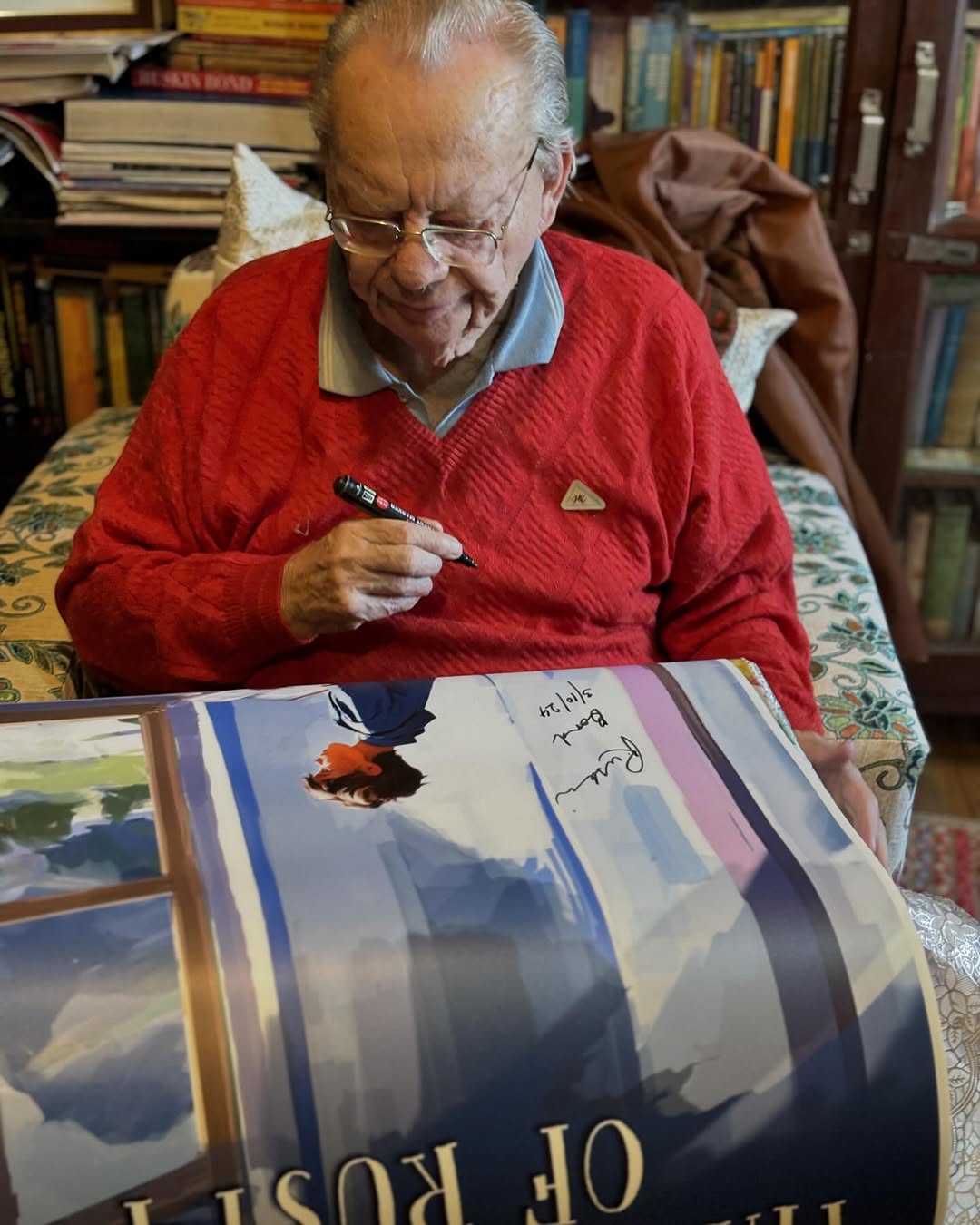When you think of Indian literature, names like Rabindranath Tagore, R.K. Narayan, and Vikram Seth often come to mind. However, there is another author whose works have quietly captured the hearts of readers across generations—Ruskin Bond. Known for his evocative writing style, his ability to capture the beauty of nature, and his deep connection with the hills of India, Bond is an iconic figure in Indian literature.
This article will explore the life, works, and the legacy of Ruskin Bond, a man whose stories offer a glimpse into the simpler, more peaceful life in the hills, away from the hustle and bustle of urban existence.
Who is Ruskin Bond?
Ruskin Bond was born on May 19, 1934, in Kasauli, a small hill station in the northern Indian state of Himachal Pradesh. His family was of English descent, and Bond spent much of his childhood moving between different locations, as his father was in the military. He has lived in various places, including the hill stations of India, and currently resides in Mussoorie, which has often found its way into the settings of his stories.
What makes Ruskin Bond stand out is his ability to create vivid, personal narratives, many of which focus on his childhood, nature, and the world around him. His works tend to be simple yet profound, resonating with readers of all ages and from all walks of life.
Early Life and Education
Ruskin Bond’s early life was marked by a series of relocations. Born to an Anglo-Indian family, he had a somewhat nomadic childhood, which allowed him to experience a variety of places and people. Bond’s father, a British Army officer, was stationed in several locations across India, and the young Ruskin found himself moving frequently.
However, his formative years were spent in the picturesque hills of the Himalayas. His mother, who was an English woman, and his father eventually separated, and Bond was raised by his mother and grandmother in Dehradun, where he completed his schooling.
Bond attended Sherwood College in Nainital, and it was here that he first began to develop an interest in writing. He was influenced by the beautiful landscapes, the people he met, and the tranquil surroundings that would later feature in much of his work.
Ruskin Bond’s Writing Career

Ruskin Bond’s literary journey began at an early age. At the age of just 17, he won a short story competition conducted by the The English PEN and saw his first story published in 1944. But it wasn’t until he moved to London in his early twenties that Bond decided to pursue writing full-time. His first book, “The Room on the Roof,” was published in 1956, when Bond was just 22. The novel, written in the first-person, is an autobiographical coming-of-age story about a young English boy, Rusty, living in the hills of India.
The Room on the Roof
This novel, set in the small town of Dehradun, became an instant hit and marked Bond’s entry into the world of Indian literature. The story was simple yet poignant and reflected Bond’s deep connection with the natural surroundings of his childhood. The novel won the prestigious John Llewellyn Rhys Prize, which boosted his career.
Themes in Ruskin Bond’s Works
Ruskin Bond’s literary style is marked by its simplicity, warmth, and depth. Despite having a relatively simple writing style, he weaves stories that are rich in meaning and emotion. His works predominantly revolve around the themes of nature, nostalgia, solitude, and human relationships. Bond’s writing reflects a deep love for the environment and an intense connection with the natural world.
Love for Nature
Bond’s love for nature is one of the most prominent themes in his works. Whether it’s the majestic Himalayan ranges, the lush forests, or the small streams and valleys, the landscape plays an integral role in his stories. In many ways, his writing can be seen as a tribute to the natural world that has shaped his life.
For example, his short stories, such as “The Cherry Tree,” “The Eyes Have It,” and “The Night Train at Deoli,” showcase his love for nature. Bond’s vivid descriptions of the landscape bring the setting to life, making the reader feel as though they are walking alongside the protagonist, experiencing nature firsthand.
Ruskin Bond’s Famous Works
Ruskin Bond’s body of work is vast and varied, spanning novels, short stories, essays, and children’s books. Here are a few of his most famous works:
1. The Night Train at Deoli and Other Stories
This collection of short stories is one of Ruskin Bond’s best-known works. The stories capture various aspects of life in India, focusing on emotions such as longing, loss, and love. In “The Night Train at Deoli,” for example, Bond beautifully describes a young boy’s infatuation with a girl he meets at a train station, blending melancholy with the magic of fleeting moments.
2. The Blue Umbrella
The Blue Umbrella is a children’s novel that is as heartwarming as it is simple. It tells the story of a young girl named Binya, who acquires a beautiful blue umbrella and becomes the object of envy in her small village. The novel explores themes of greed, kindness, and human nature.
In 2005, The Blue Umbrella was adapted into a Bollywood film directed by Vishal Bhardwaj. The film received critical acclaim for its portrayal of life in rural India and the story’s simple yet poignant themes.
3. Rusty Series
Bond’s Rusty Series of books, featuring the character Rusty, are beloved by readers of all ages. These books are based on Bond’s own childhood experiences in India and reflect the adventures and emotional growth of a young boy in the Indian subcontinent. The books, such as “Rusty, the Boy from the Hills,” “Rusty Runs Away,” and “Rusty and the Leopard,” became a part of many children’s lives, serving as an introduction to the world of literature.
Ruskin Bond’s Writing Style
One of the things that makes Ruskin Bond’s writing so unique is his simple yet powerful prose. His works are often short and to the point, making them easily accessible to readers of all ages. However, it’s the richness of the imagery and the depth of his characters that elevate his stories beyond mere children’s books.
Bond’s style is also notable for its nostalgic quality. Many of his works reflect a longing for a simpler time when life was slower, people were kinder, and nature was unspoiled. This quality resonates strongly with readers who, like Bond, feel disconnected from the fast-paced, technology-driven world of today.
Also Like It iclsn.com
Ruskin Bond’s Influence and Legacy
Ruskin Bond has had a profound influence on Indian literature, especially in the realm of children’s books and short stories. His works have been translated into several languages, including Hindi, French, German, and Dutch, making him one of the most recognized authors in India and abroad.
Awards and Recognition
Over the years, Bond has received numerous awards for his contribution to literature. In 1999, he was awarded the Padma Shri, one of India’s highest civilian awards, for his contribution to literature. He was also honored with the Sahitya Akademi Award in 1992 for his work in children’s literature. In 2014, he was awarded the Padma Bhushan, the second-highest civilian award in India.
Cultural Impact
What makes Ruskin Bond’s works so endearing is not just the stories themselves but the way they capture the essence of life in the Indian hills. His writings give readers an escape into a world where life is simpler, quieter, and more connected with nature. Bond’s stories have influenced not just generations of readers but also filmmakers, with several of his works being adapted for the screen.
Conclusion
Ruskin Bond is much more than just an author; he is a symbol of a time when literature was an escape into nature, an exploration of simpler truths, and a reflection of human emotions in their purest form. His legacy continues to inspire readers, young and old, who are drawn to the beauty of his writing and the simplicity of his stories.
Whether it’s his evocative descriptions of the hills, his portrayal of childhood innocence, or his exploration of universal human emotions, Ruskin Bond’s works will continue to charm and captivate readers for generations to come.
